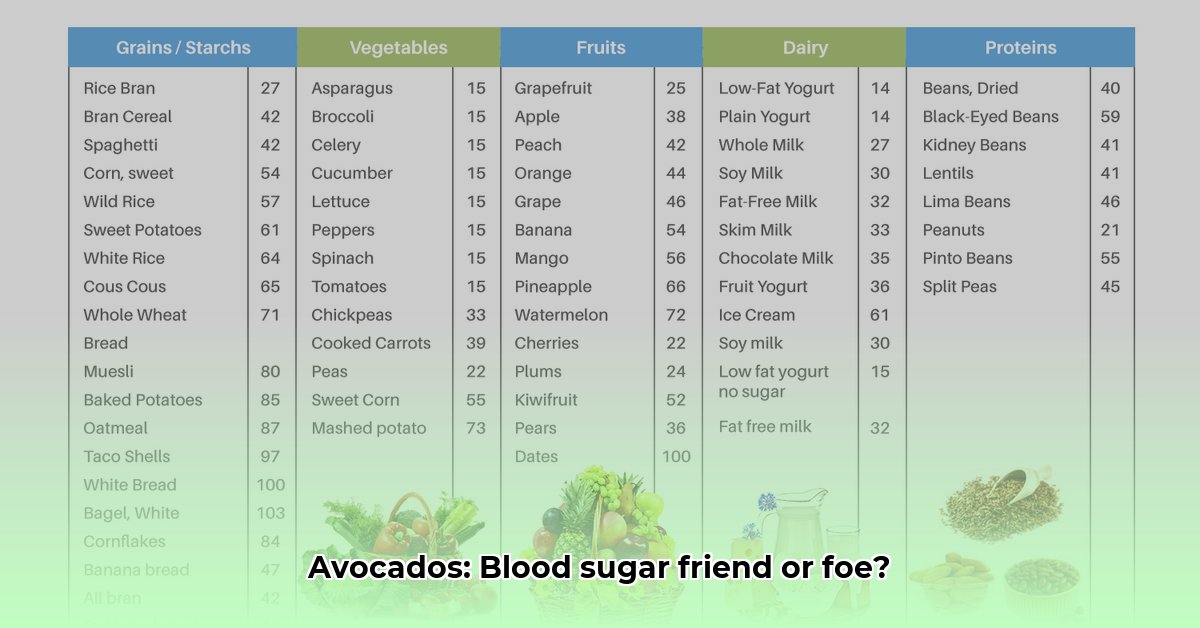Avocados are a delicious and nutrient-rich food, but their impact on blood sugar is sometimes misunderstood. This comprehensive guide explores the glycemic index (GI) and glycemic load (GL) of avocados, explaining how these values relate to blood sugar management, particularly for individuals with diabetes.
Understanding Glycemic Index and Load
Before delving into avocado’s specifics, let’s clarify what GI and GL mean. The glycemic index (GI) ranks carbohydrates on a scale of 0 to 100 based on how quickly they raise blood sugar levels after consumption. Pure glucose serves as the benchmark with a GI of 100. The glycemic load (GL) provides a more practical measure by considering both the GI and the amount of carbohydrate in a typical serving. A food with a high GI might have a low GL if consumed in small portions.
Avocado’s GI and GL: Demystifying the Numbers
Avocados typically have a GI estimated between 10 and 55, though some sources report values below 15 or closer to 40. These discrepancies likely arise from variations in testing methods and the ripeness of the avocados used in studies. Ripe avocados naturally contain more sugars than unripe ones. Crucially, regardless of GI variations, the GL of avocado consistently remains low, generally around 1 or less per serving. This suggests avocados have a minimal impact on blood sugar levels.
How Avocados Support Healthy Blood Sugar
Several factors contribute to avocado’s blood-sugar-friendly profile:
- Fiber: Avocados are rich in fiber, which slows digestion and prevents rapid sugar absorption, promoting stable blood sugar levels.
- Healthy Fats: The monounsaturated fats (MUFAs) in avocados may improve insulin sensitivity, allowing the body to regulate blood sugar more effectively.
- Low Sugar Content: Avocados are naturally low in sugar, further minimizing their impact on blood glucose.
- D-mannoheptulose: This unique sugar found in avocados is being researched for its potential role in lowering blood sugar and improving insulin response. While promising, further research is needed to confirm these effects.
Avocados and Diabetes Management
Due to their low GI and GL, avocados can be a valuable addition to a diabetes-friendly diet. They provide essential nutrients without causing significant blood sugar fluctuations. However, moderation is key. While healthy, avocados are calorie-dense due to their high fat content, so portion control remains important.
Avocado Nutrition Breakdown
A typical 100g serving of avocado (approximately ⅔ of a medium avocado) offers:
| Nutrient | Amount |
|---|---|
| Calories | ~160-200 |
| Fat | 15-17g |
| Protein | 2-3g |
| Carbohydrates | 9-10g |
| Fiber | 6.7-7g |
| Sugar | <1g |
The high fiber and healthy fat content, combined with the low sugar content, contribute to avocado’s minimal glycemic impact.
Serving Size Matters
A standard avocado serving is about ⅓ to ½ of a medium fruit (approximately 50g). This portion aligns with the reported low GL values. Consuming larger portions increases overall carbohydrate intake, potentially influencing the GL.
Avocado Varieties and GI/GL
Research on GI/GL variations between avocado varieties is limited. While slight differences are possible, all varieties are generally considered low glycemic.
Avocado vs. Other Fruits
Compared to higher-GI fruits like bananas and mangoes, avocados offer a more blood-sugar-friendly option. They provide the creamy satisfaction of a fruit without the dramatic blood sugar swings. A quick comparison:
| Fruit | Approximate GI | Approximate GL |
|---|---|---|
| Avocado | 40 | <5 |
| Banana | 51 | 12 |
| Apple | 39 | 6 |
| Orange | 40 | 9 |
Incorporating Avocados into Your Diet
Adding avocados to your meals is simple and delicious:
- Salads: Add sliced avocado for a creamy texture and healthy fats.
- Sandwiches and Wraps: Mashed or sliced avocado adds flavor and nutrients.
- Toast: Spread mashed avocado on whole-wheat toast for a nutritious breakfast or snack.
- Smoothies: Blend avocado into smoothies for a creamy boost.
- Guacamole: Enjoy classic guacamole with whole-grain chips or vegetables.
- Eggs: Top scrambled eggs or omelets with diced avocado.
- Grilled Chicken or Fish: Avocado complements grilled proteins beautifully.
Frequently Asked Questions
- Can I eat avocado every day if I have diabetes? Yes, you can enjoy avocado daily in moderation as part of a balanced meal plan.
- Will avocados raise my blood sugar? Avocados have a minimal impact on blood sugar due to their low GI and GL.
Conclusion
Avocados are a nutritious and blood-sugar-friendly food that can be enjoyed as part of a healthy diet, especially for individuals managing diabetes. While this information is based on current research, consulting a healthcare professional or registered dietitian is always recommended for personalized dietary advice. They can help you create a meal plan tailored to your specific needs and health goals.
- Divided Food Storage Containers Transform Meal Prep and Portion Control - February 8, 2026
- Divided Food Containers Are Meal Preps Secret Weapon - February 7, 2026
- Food Kits for Adults Offer Fun DIY Cooking Adventures - February 6, 2026










